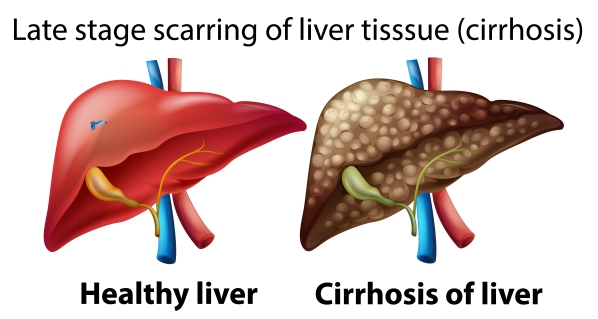What is Hepatitis?
Hepatitis is when your liver is inflamed, most commonly due to a viral infection or some other causes. It can also result from medications, drugs or alcohol abuse. However, the resulting symptoms are almost similar.
The liver is an essential organ found in the right upper abdomen and is responsible for many important functions in your body namely digestive functions, removal of toxins from the body, activation of important enzymes, manufacture of essential proteins in the blood and last but not least, synthesis of factors needed for blood clotting. When your liver is inflamed, these functions are impaired resulting in a variety of signs and symptoms.
Hepatitis affects over 4 million of people in the United States and is undiagnosed in many cases. Management of hepatitis depends on your underlying cause and lifestyle.
Causes and risk factors of viral hepatitis
Infectious type of hepatitis is caused by the hepatitis virus. There are five types of viruses known to cause the inflammation of your liver namely hepatitis A, B, C, D, and E virus.
Hepatitis A
Hepatitis A is highly contagious and usually occurs in epidemics. It is transmitted through contaminated food or water. This arises most commonly in developing countries with poor sanitation or overcrowding. It is not transmitted through air droplets when sneezing or coughing. Hepatitis A virus (HAV) can also be transmitted through sexual contact.

Hepatitis B
Hepatitis B, caused by the hepatitis B virus (HBV), is a serious type of liver inflammation which results in a more chronic type of disease. The virus is transmitted from person to person through infected bodily fluids such as semen, blood or other bodily fluids. Therefore, it can spread through sexual contact, sharing of needles in intravenous drug users and accidental needle pricks. It can also be transmitted from an infected mother to her child during childbirth.
Hepatitis C
Hepatitis C virus (HCV) most commonly spreads through contaminated blood. It is transmitted through needles in intravenous drug users and through blood transfusions. It can also result from organ transplants. Very rarely, hepatitis C is transmitted during sexual intercourse. Most patients with Hepatitis C have no symptoms. However, it can follow a chronic course and lead to further complications.
Hepatitis D
This is a form of hepatitis caused by the hepatitis D virus (HDV). This causes a serious type of disease and is transmitted through contact with contaminated blood. Despite being severe, it is a rare form of hepatitis which only occurs together with hepatitis B infection.
Hepatitis E
Similar to hepatitis A, the type of disease caused by hepatitis E virus (HEV), is transmitted through contaminated water or food. The virus is generally found in fecal matter which can cause contamination of water supplies. HEV is also most common in areas of poor sanitation.

Other causes of Hepatitis
Inflammation of the liver can arise due to alcohol abuse. This is also known as alcoholic hepatitis. The excess alcohol cause damage and stress to your liver cells which, if not managed properly, can result in irreversible damage to your liver including scarring of your liver tissue. Through the same mechanism, certain drugs or medications can lead to hepatitis.
Certain autoimmune conditions can also result in hepatitis. This is when your own immune system perceives your liver as harmful and attacks it. Women are more prone to have autoimmune hepatitis compared to men. Whatever the underlying cause is, hepatitis always causes impaired functioning of your liver.
Signs and symptoms of hepatitis
Some types of hepatitis such as hepatitis B and C may not manifest symptoms at the beginning of the disease. However, symptoms start to appear as the disease progresses. These may include:
- Fatigue
- Nausea and vomiting
- Abdominal pain and tender right upper abdomen
- Loss of appetite
- Fever
- Dark urine
- Pale stools
- Jaundice present as yellow skin or yellow sclera (whitish part of your eye)
- Itchy skin
- Weakness
- Weight loss
- Distended abdomen due to accumulation of fluid (Ascites)
Signs and symptoms will greatly vary on the extent and progress of the disease.

Making a diagnosis
Even if the different types of hepatitis can present with similar symptoms, it is important to know exactly the underlying cause in order to initiate appropriate treatment as needed.
Like for any other disease, your doctor will start by taking a good medical history. This will guide him/her towards an infectious or non-infectious type of hepatitis. Following the history, your doctor will examine you and more particularly your abdomen. Further tests may also be ordered to confirm the diagnosis. These tests include:
- Liver function tests: Your liver normally secretes enzymes in your blood which take part in several functions. If you have hepatitis, these enzymes are most likely to be elevated. Therefore, liver function tests are useful to assess how well your liver is functioning.
- Other blood tests: Other tests may include blood tests to check for the presence of the different types of hepatitis virus in the blood. They can also detect for the presence of antibodies, for example in autoimmune hepatitis.
- Ultrasound: Ultrasound scans are helpful to visualize structures and organs in your abdomen in order to look for any abnormalities which could possibly be causing your symptoms.
- Liver biopsy: In this procedure, a sample of your liver is taken with a needle. The sample is then sent to be analysed to find any abnormalities and the underlying cause. It can also help to determine the extent of your liver disease.


Management of hepatitis
The different treatments available depends on the type of hepatitis and the course. Management of hepatitis is as follows:
- Hepatitis A: Hepatitis A is usually a self-limiting and benign condition. Treatment if mostly targeted to relieve your symptoms such as vomiting or diarrhoea. For the latter, the main goal will be to prevent dehydration and nutritional deficits.
- Hepatitis B: In the acute phase, there are no treatment for hepatitis B. however, antivirals are available for chronic hepatitis B. The treatment is lengthy and requires proper monitoring and evaluation to assess the response.
- Hepatitis C: Antivirals are recommended for both the acute and chronic phase of hepatitis C. It is important to correctly manage hepatitis C as it can progress to liver cirrhosis. In that case, the individuals may have to undergo liver transplant.
- Hepatitis D: There are no specific treatments for hepatitis D. Interferon alpha has been used but has shown limited success. Liver transplantation may be required depending on the extent of the disease.
- Hepatitis E: No specific treatment is available for hepatitis E. It is usually a self-limiting disease. Similar to Hepatitis A, management is mostly geared towards hydration, nutrition and avoidance of alcohol.
- Autoimmune hepatitis: Immunosuppressant therapies such as with corticosteroids are most commonly used in the case of autoimmune hepatitis. Examples of corticosteroids that can be used are prednisolone or budesonide. If liver cirrhosis occurs, liver transplantation may be the only possible treatment.

Complications of hepatitis
Some of the complications of viral hepatitis are:
- Hepatic necrosis: This is when the cells of your liver die due to the stress and injury caused by the virus and are no longer able to perform their function.
- Cirrhosis: This occur usually in long standing liver inflammation. Normal liver tissue is replaced by scar tissue. This is a slow process which takes months or years to develop.
- Liver failure: This is when your liver is losing or has lost all of its ability to function normally. This is a life threatening condition as your liver is responsible for many important functions in your body.
- Hepatocellular carcinoma: This arises from HBV or HCV. This is the most common type of liver cancer. It commonly occurs in long standing liver diseases.
Prevention of hepatitis
Prevention varies according to the type of viral hepatitis.
- Hepatitis A: A vaccine is available for hepatitis A. Vaccination starts in children aged 12 to 18 months and is done as a series of 2 vaccines. It is also available for adults.
- Hepatitis B: Vaccination against hepatitis B is also available. It is usually done in all newborn and is completed over the first 6 months of the child. It is also recommended among healthcare professionals as they are likely to be exposed to the virus.
- Hepatitis C: No vaccine is available for hepatitis C.
- Hepatitis D: There are no vaccine for hepatitis D. However, since it is known that it cannot exist without hepatitis B Virus, the prevention is aimed at preventing hepatitis B infection.

Prognosis of hepatitis
Most people with the benign forms of hepatitis will get well without any consequence. However, there are many patients who will not recover completely. About 5 to 10% of Hepatitis B patients will progress to chronic hepatitis. Similarly, 75 to 80% of HCV infections will follow a chronic course. As mentioned earlier, the complications associated with hepatitis more commonly arise from chronic forms of hepatitis.

Source:
J. Alastair, I. and Simon, M., 2016. Davidson’s Essentials of Medicine. 2nd ed. London: ELSEVIER.
Parveen, K. and Michael, C., 2017. Kumar & Clarks Clinical Medicine. 9th ed. The Netherlands: ELSEVIER.
Samji, N., 2017. Viral Hepatitis
Previsani N, Lavanchy D, World Health Organization. Hepatitis B (WHO/CDS/CSR/LYO/2002.2). 2002.
World Health Organization. Guidelines for the prevention, care and treatment of persons with chronic hepatitis B infection. 2015 Mar.









